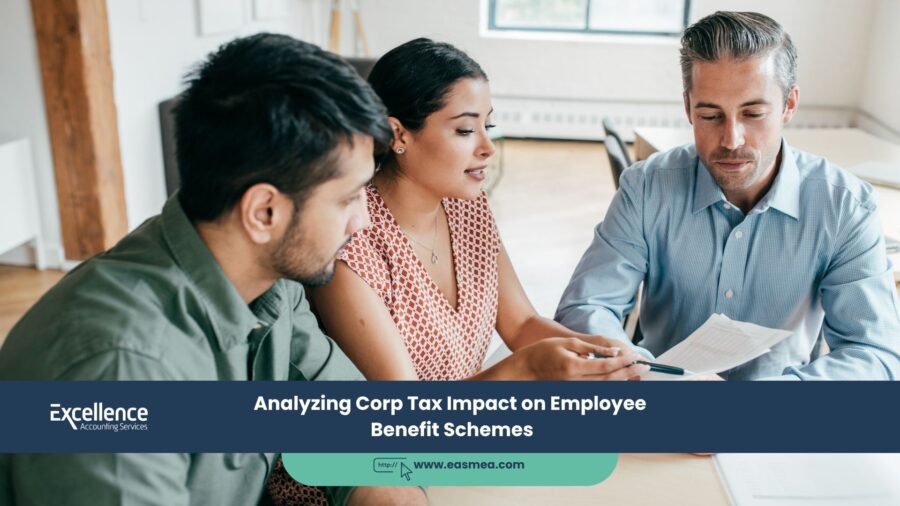Analyzing Corp Tax Impact on Employee Benefit Schemes
The introduction of the UAE Corporate Tax (CT) has fundamentally reshaped the financial landscape for businesses, extending its influence far beyond headline profit calculations. One of the most critical and intricate areas impacted is the treatment of employee compensation and benefits. For decades, companies in the UAE have competed for talent by offering attractive remuneration packages. Now, every component of that package—from the basic salary and end-of-service gratuity to complex share option schemes—must be scrutinized through a new tax lens. What was once purely an HR and finance consideration is now a key area of tax strategy.
- Analyzing Corp Tax Impact on Employee Benefit Schemes
- Part 1: The Foundation - The "Wholly and Exclusively" Principle
- Part 2: A Deep Dive into Specific Employee Benefit Schemes
- Part 3: The Critical Issue - Payments to Connected Persons
- What Excellence Accounting Services (EAS) Can Offer
- Frequently Asked Questions (FAQs)
- Optimize Your Employee Benefit Strategy for the Tax Era.
Understanding the deductibility of these expenses is paramount. Employee costs typically represent one of the largest expenditures for any business. Maximizing their deductibility against taxable income is essential for effective tax management. However, the Corporate Tax Law has introduced specific rules, conditions, and limitations that require careful navigation. This is not simply about whether an expense can be claimed; it’s about *how* it’s structured, documented, and justified. This guide provides a comprehensive analysis of the impact of UAE Corporate Tax on various employee benefit schemes, offering strategic insights for businesses to ensure compliance, optimize their tax position, and continue to attract and retain top talent in this new fiscal era.
Key Takeaways: Tax and Employee Benefits
- General Deductibility: Most employee-related expenses are deductible if they are “wholly and exclusively” for business purposes and are properly documented.
- End-of-Service Gratuity: Accruals for EOSG are generally deductible as they are incurred, aligning with accounting standards. Contributions to separate pension funds are also deductible under specific conditions.
- Share Schemes: The cost of employee share schemes is deductible, typically based on the expense recognized in the financial statements under IFRS 2.
- Payments to Connected Persons: Remuneration paid to owners, directors, or their relatives is subject to scrutiny and must be at an “arm’s length” or market rate to be fully deductible.
- Documentation is Crucial: To claim any deduction, businesses must maintain robust records, including employment contracts, payroll records, and board resolutions.
Part 1: The Foundation – The “Wholly and Exclusively” Principle
The cornerstone of deductibility for any business expense under the UAE Corporate Tax Law is the “wholly and exclusively” principle. Article 28 of the Law states that, to be deductible, an expenditure must be incurred wholly and exclusively for the purposes of the taxpayer’s business.
When applied to employee benefits, this means the cost must be part of the remuneration package provided in return for the employee’s service to the business. It cannot be an arbitrary payment, a distribution of profits in disguise, or an expense of a purely personal nature for the employee that provides no business benefit. For the vast majority of standard employee costs (salaries, medical insurance, etc.), meeting this test is straightforward. However, for more complex or discretionary payments, this principle is the first hurdle that must be cleared. This requires meticulous accounting and bookkeeping to create a clear link between the expense and the business activity.
Part 2: A Deep Dive into Specific Employee Benefit Schemes
Let’s break down the tax treatment of the most common components of an employee remuneration package in the UAE.
1. Salaries, Wages, and Cash Bonuses
Tax Treatment: These are the most straightforward of all employee expenses. Salaries, regular wages, and performance-based cash bonuses paid to employees are fully deductible in the tax period in which they are incurred.
Strategic Consideration: The key here is robust documentation. Your business must maintain a clear and auditable trail through a professionally managed payroll system, supported by formal employment contracts that specify the terms of remuneration. For bonuses, having a clear, documented bonus policy and board approval can strengthen the “wholly and exclusively” argument.
2. End-of-Service Gratuity (EOSG) and Pension Schemes
This is a particularly important area under the new law. EOSG is a statutory liability for nearly all employers in the UAE.
Tax Treatment for EOSG: The Corporate Tax Law allows for the deduction of EOSG expenses as they are accrued in the financial statements in accordance with accepted accounting standards (like IAS 19). This is a significant clarification, meaning a business does not have to wait until an employee leaves and the cash is paid out to claim the deduction. The annual provision made in the books is deductible.
Tax Treatment for Pension/Provident Funds: Many companies are moving towards defined contribution schemes like pension or provident funds. Contributions made by an employer to a regulated pension or provident fund are deductible, provided that the primary purpose of the fund is to provide for employee retirement or termination benefits.
This alignment of tax treatment with accounting accruals for EOSG is a major advantage for businesses, as it allows for a smoother, more predictable deduction process that matches the economic reality of the liability.
3. Employee Share Schemes (e.g., ESOPs)
Share schemes are a popular tool for attracting and retaining senior talent. Their tax treatment is a key concern for many businesses.
Tax Treatment: The law allows a deduction for the expenditure related to the issuance of shares or stock options to employees. The amount of the deduction is generally calculated based on the expense that is recognized in the company’s financial statements under International Financial Reporting Standard 2 (IFRS 2 – Share-based Payment). This IFRS 2 expense typically represents the fair value of the equity instruments granted to the employee, recognized over the vesting period.
Strategic Consideration: Implementing a share scheme now requires close collaboration between HR, legal, and tax teams. A formal, well-structured scheme, supported by a business valuation to determine the fair value of shares, is critical for securing the tax deduction. This is a complex area where seeking advice from a virtual CFO can be highly beneficial.
4. Allowances and Benefits-in-Kind
Remuneration packages in the UAE often include a variety of allowances and non-cash benefits.
- Allowances: Cash payments for housing, transport, children’s education, etc., are fully deductible as part of the employee’s overall salary package.
- Benefits-in-Kind: The cost of providing benefits like company cars, accommodation, or health insurance is also fully deductible. The deductible amount is the actual cost incurred by the employer in providing that benefit.
The critical factor for both is that they must be documented as part of the formal employment agreement to be defensibly “for the purpose of the business.” A robust HR consultancy can help ensure contracts are structured correctly.
Part 3: The Critical Issue – Payments to Connected Persons
This is one of the most significant areas of scrutiny under the Corporate Tax Law. A “Connected Person” includes the owner of the business, a director or officer, their relatives, and other entities they may control.
The Arm’s Length Test
While remuneration paid to a Connected Person is deductible, it is subject to a crucial test: the payment must be consistent with the **Arm’s Length Principle**. This means the salary, bonus, or benefit paid to the owner-manager or their family member must be comparable to what would be paid to an independent, unrelated person for performing the same role with the same level of experience and responsibility.
| Scenario | Deductibility | Reasoning |
|---|---|---|
| An owner-manager pays themself a salary of AED 1,000,000 per year, which is in line with the market rate for a CEO of a similar-sized company. | Fully Deductible | The remuneration meets the Arm’s Length standard. It is a legitimate business expense. |
| An owner pays themself a “bonus” of AED 5,000,000 at the end of the year, which is far above market norms and appears to be a way of extracting profits. | Potentially Disallowed | The amount exceeding the market rate could be re-characterized by the FTA as a non-deductible distribution of profit, not a genuine salary expense. |
Businesses must be prepared to justify the remuneration paid to Connected Persons with market data, job descriptions, and clear evidence of the value they provide. Regular internal audits should review these payments for compliance.
What Excellence Accounting Services (EAS) Can Offer
Navigating the tax implications of employee benefits requires a multidisciplinary approach. At EAS, our team of experts provides integrated support to ensure your remuneration strategies are both competitive and tax-compliant.
- Corporate Tax Advisory: Our Corporate Tax specialists provide detailed guidance on the deductibility of all forms of employee remuneration and help you structure benefit schemes for optimal tax efficiency.
- Payroll Management: We offer comprehensive payroll services to ensure accurate calculations, timely payments, and the creation of robust records required for CT deductions.
- HR & Contractual Support: Through our HR consultancy, we can assist in drafting and reviewing employment contracts to ensure they are compliant and support the tax deductibility of benefits.
- Connected Person Remuneration Studies: We conduct market-based remuneration studies to help you justify the salaries and benefits paid to owners and directors, ensuring compliance with the Arm’s Length Principle.
- Financial Reporting: Our team ensures your financial statements correctly account for complex items like EOSG provisions and share-based payments, forming the basis for your tax calculations.
Frequently Asked Questions (FAQs)
Yes. The expense is deductible when it is accrued in your books according to accounting standards (like IAS 19), not just when it is paid out. This allows for a more consistent annual deduction.
Yes, but only to the extent that they meet the Arm’s Length standard. The remuneration must be equivalent to what would be paid to an independent third party for the same role. Any excess amount may be disallowed as a deduction and treated as a distribution of profits.
The deduction is generally based on the expense calculated under IFRS 2 (Share-based Payment) and recognized in your financial statements. This expense, which reflects the fair value of the options, is typically spread over the vesting period.
Yes, expenditure incurred to entertain employees, such as for a staff party, is generally deductible as it is incurred for the purpose of employee morale and welfare, which is a legitimate business purpose.
It is highly recommended to review them. Contracts should be clear, comprehensive, and detail all components of the remuneration package. This provides crucial evidence to support the “wholly and exclusively” test for all benefit-related deductions.
Contributions to a pension fund, whether domestic or foreign, are deductible provided the fund is regulated and its primary purpose is for employee retirement/termination benefits. The specifics may require a detailed review of the fund’s structure.
Absolutely. These costs are considered to be incurred for the purpose of improving employee skills and performance, which directly benefits the business. They are fully deductible.
There isn’t a single one, but the most critical are: 1) The formal employment contract, 2) The monthly payroll register/payslips, and 3) Proof of payment (e.g., bank transfer records). For benefits-in-kind, you also need the supplier invoices (e.g., the health insurance invoice).
Yes, provided these benefits are formally included as part of the employee’s total remuneration package in their employment contract. If they are, they are considered part of the cost of employing that individual and are deductible.
While a QFZP may benefit from a 0% CT rate on qualifying income, it must still calculate its taxable income according to the standard CT rules. This includes applying the rules for deducting employee expenses. Furthermore, non-arm’s length transactions (e.g., excessive management fees paid to a mainland related party) could impact its qualifying status.
Conclusion: A Strategic Alignment of HR, Finance, and Tax
The UAE Corporate Tax Law has elevated the management of employee benefits from an operational task to a strategic imperative. Every component of your compensation philosophy now has a direct tax consequence. A proactive, documented, and justifiable approach is essential to maximize legitimate deductions and mitigate compliance risks. Businesses that successfully align their HR, finance, and tax strategies will not only ensure compliance but will also be able to design more efficient and attractive remuneration packages, securing a vital competitive edge in the UAE’s dynamic market.




